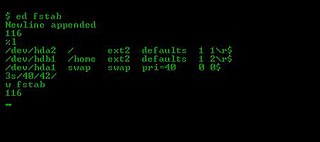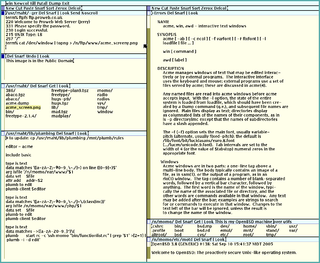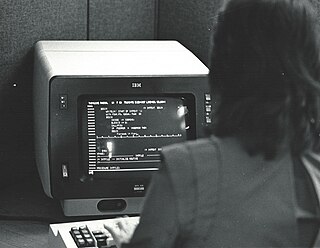
ed is a line editor for Unix and Unix-like operating systems. It was one of the first parts of the Unix operating system that was developed, in August 1969. It remains part of the POSIX and Open Group standards for Unix-based operating systems, alongside the more sophisticated full-screen editor vi.

Plan 9 from Bell Labs is a distributed operating system which originated from the Computing Science Research Center (CSRC) at Bell Labs in the mid-1980s and built on UNIX concepts first developed there in the late 1960s. Since 2000, Plan 9 has been free and open-source. The final official release was in early 2015.

vi is a screen-oriented text editor originally created for the Unix operating system. The portable subset of the behavior of vi and programs based on it, and the ex editor language supported within these programs, is described by the Single Unix Specification and POSIX.

Windows Notepad is a simple text editor for Windows; it creates and edits plain text documents. First released in 1983 to commercialize the computer mouse in MS-DOS, Notepad has been part of every version of Windows ever since.

Acme is a text editor and graphical shell from the Plan 9 from Bell Labs operating system, designed and implemented by Rob Pike. It can use the Sam command language. The design of the interface was influenced by Oberon. It is different from other editing environments in that it acts as a 9P server. A distinctive element of the user interface is mouse chording.
Cut, copy, and paste are essential commands of modern human–computer interaction and user interface design. They offer an interprocess communication technique for transferring data through a computer's user interface. The cut command removes the selected data from its original position, and the copy command creates a duplicate; in both cases the selected data is kept in temporary storage called the clipboard. Clipboard data is later inserted wherever a paste command is issued. The data remains available to any application supporting the feature, thus allowing easy data transfer between applications.

In computing, a Control keyCtrl is a modifier key which, when pressed in conjunction with another key, performs a special operation. Similarly to the Shift key, the Control key rarely performs any function when pressed by itself. The Control key is located on or near the bottom left side of most keyboards, with many featuring an additional one at the bottom right.

Sam is a multi-file text editor based on structural regular expressions. It was originally designed in the early 1980s at Bell Labs by Rob Pike with the help of Ken Thompson and other Unix developers for the Blit windowing terminal running on Unix; it was later ported to other systems. Sam follows a classical modular Unix aesthetic. It is internally simple, its power leveraged by the composability of a small command language and extensibility through shell integration.
Mouse chording is the capability of performing actions when multiple mouse buttons are held down, much like a chorded keyboard and similar to mouse gestures.

The Oberon System is a modular, single-user, single-process, multitasking operating system written in the programming language Oberon. It was originally developed in the late 1980s at ETH Zurich. The Oberon System has an unconventional visual text user interface (TUI) instead of a conventional command-line interface (CLI) or graphical user interface (GUI). This TUI was very innovative in its time and influenced the design of the Acme text editor for the Plan 9 from Bell Labs operating system.

In computing, text-based user interfaces (TUI), is a retronym describing a type of user interface (UI) common as an early form of human–computer interaction, before the advent of bitmapped displays and modern conventional graphical user interfaces (GUIs). Like modern GUIs, they can use the entire screen area and may accept mouse and other inputs. They may also use color and often structure the display using box-drawing characters such as ┌ and ╣. The modern context of use is usually a terminal emulator.
9P is a network protocol developed for the Plan 9 from Bell Labs distributed operating system as the means of connecting the components of a Plan 9 system. Files are key objects in Plan 9. They represent windows, network connections, processes, and almost anything else available in the operating system.

Norton Commander (NC) is a discontinued prototypical orthodox file manager (OFM), written by John Socha and released by Peter Norton Computing. NC provides a text-based user interface for managing files on top of MS-DOS. It was officially produced between 1986 and 1998. The last MS-DOS version of Norton Commander, 5.51, was released on July 1, 1998.

XEDIT is a visual editor for VM/CMS using block mode IBM 3270 terminals.
Plan 9 from User Space is a port of many Plan 9 from Bell Labs libraries and applications to Unix-like operating systems. Currently it has been tested on a variety of operating systems including: Linux, macOS, FreeBSD, NetBSD, OpenBSD, Solaris and SunOS. The project's name is a reference to the 1950s Ed Wood film Plan 9 from Outer Space.

Robert Pike is a Canadian programmer and author. He is best known for his work on the Go programming language while working at Google and the Plan 9 operating system while working at Bell Labs, where he was a member of the Unix team.
Wily or WILY could refer to:
This page is based on this
Wikipedia article Text is available under the
CC BY-SA 4.0 license; additional terms may apply.
Images, videos and audio are available under their respective licenses.













